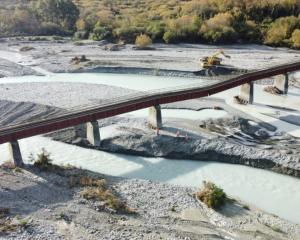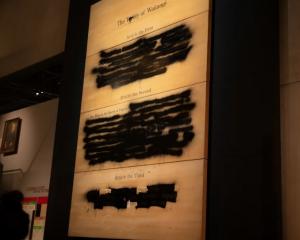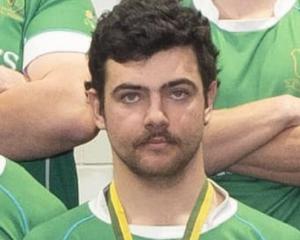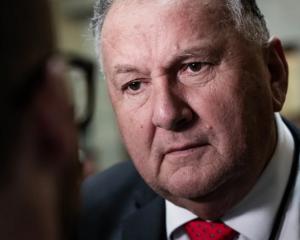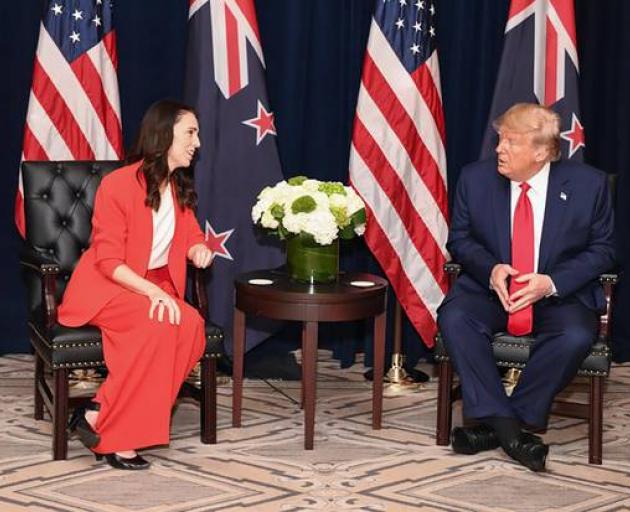
The meeting has been highly anticipated, not only because the New Zealand Prime Minister has been painted as an anti-Trump figure, but also because The New Zealand Herald understands that it was Trump who sought the meeting and was particularly interested in meeting Ardern in person.
Ardern emerged from the meeting - for which media were banned - at the InterContinental Hotel with warm smiles and high praise for Trump.
"President Trump views New Zealand very warmly, views the relationship very warmly and holds New Zealand in very high regard," she told reporters in New York.
"He was interested in everything from tourism to what occurred in Christchurch. We even had a conversation around our gun buyback and the process we had gone through there."
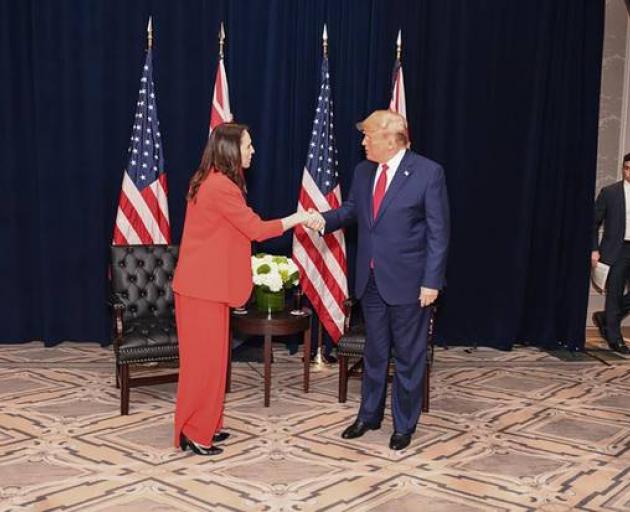
It banned most military-style semi-automatic firearms and led to a buyback process that so far has collected about 20,000 firearms and paid out $36.7 million.
Trump has met with survivor Farid Ahmed at the White House and talked about possible gun law reform in the US, which he has previously opposed.
Ardern said Trump showed an interest in what New Zealand had done.
"We were able to move quickly and with consensus, and that obviously stood out to the world... he listened with interest. I certainly wouldn't want to predetermine that that means anything in particular for the US other than an interest in what we did."
She explained to Trump that Australia had also re-written gun laws after the Port Arthur Massacre and New Zealand had been able to learn from that experience.
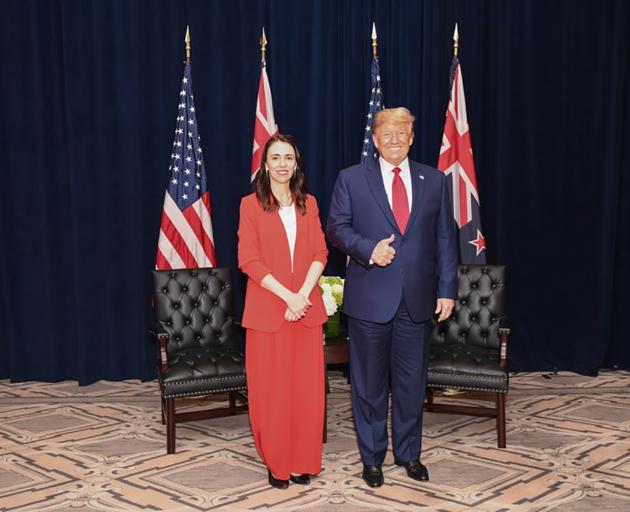
A free trade deal was also discussed, and the Herald understands that senior trade officials are scheduled to visit Washington in next month for preliminary talks about a possible agreement.
Ardern said that Trump was enthusiastic about a free trade agreement with New Zealand.
"We already have a trade surplus [with the US]. The idea of continuing a conversation about New Zealand's trade relationship with the US was greeted warmly, and I expect there will be some ongoing conversations.
"These things do take time. The fact that there was that enthusiasm there to continue those conversations I think is really important."
She would not say if Trump had asked for New Zealand's support around pressuring Iran, which the US has accused of being responsible for a drone attack on Saudi Arabia.
"We discussed a number of national security issues but I won't get into detail on that," Ardern said.
She said they talked about the UN Climate Summit, which Trump attended briefly today and where Ardern delivered a keynote address, and about March 15 - but she did not ask him why the US has not signed up for the Christchurch Call.
"I don't think it has fundamentally changed the outcomes of what we've been able to deliver through the Christchurch Call."
It was more important to see tech companies wanting to change policies and practices, she said.
They also talked about the "big personalities" of New Zealand. Asked who Trump had talked about, Ardern said: "Bob Charles."
The Prime Minister said she did not have a conversation about whether Trump could visit New Zealand at the end of the year, given speculation about a possible visit to Australia at that time.
"We've got a few elections coming up soon... Apec would be an opportunity for the President to visit New Zealand in 2021."
The meeting was also attended by US Vice-President Mike Pence, Secretary of State Mike Pompeo and White House acting chief of staff Mike Mulveny, while on New Zealand's side Chris Seed, the head of the Ministry of Foreign Affairs and Trade, and Ardern's chief of staff Raj Nahna attended.
Winston Peters: Today's meeting 'diplomatic coup'
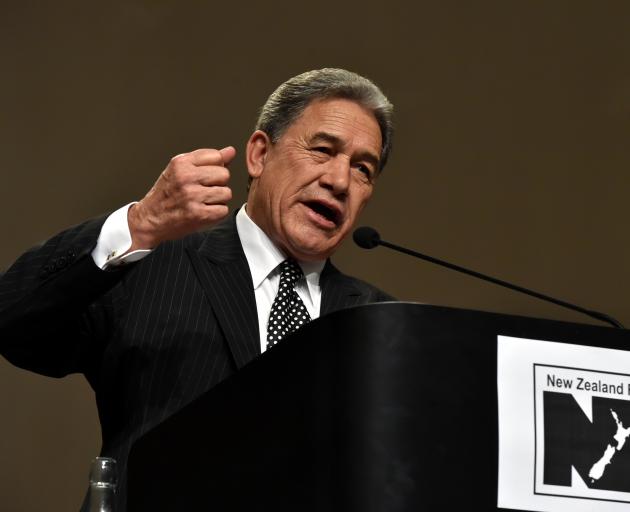
Securing the 25-minute long meeting was an achievement in its own right "given the pressure on the President's schedule".
"All the more remarkable was the level of attendance on the American side. The President was accompanied by Vice President Mike Pence, Secretary of State Mike Pompeo, and the newly appointed National Security Advisor Robert O'Brien," Peters said.
"What is clear is a very positive discussion was held on a range of international issues and areas of shared interest, including on advancing our bilateral trade interests.
"In the world of diplomacy, this level of engagement is gold."
Social media giants agree to join forces
Earlier today, the world's social media giants agreed to join forces to research how their business models can lead to radicalisation - and how best to counter disrupt online extremism, Ardern said.
She also outlined a new crisis-response framework, ready to be used immediately, where countries and tech companies work together to stop Christchurch mosque attack-type content from going viral online.
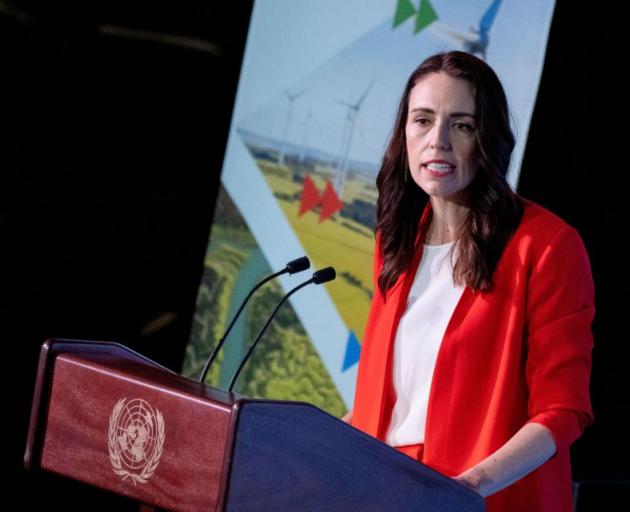
Alongside Facebook's chief operating officer Sheryl Sandberg in New York today, Ardern revealed the next steps in the efforts to meet the voluntary commitments in the Christchurch Call - with a particular focus on tackling extremism and the way it foments.
The call was signed at a Paris summit in May by 17 countries, the European Commission and eight online platforms, but now 31 more countries and two more companies – including Mexico, Sri Lanka and Chile, and the Council of Europe and UNESCO - have added their voices.
The US, however, is still holding out from signing, though it has been involved in the ongoing work.
The call's work will be driven by the Global Internet Forum to Counter Terrorism (GIFCT) - set up by Facebook, Twitter, Google (YouTube) and Microsoft in 2017 - which will become an independent body tasked with preventing and responding to terrorist and violent extremism online.
It will have dedicated teams focused on a set of goals, including looking at the companies' algorithms that potentially lead to radicalisation.
This is a step that has previously been resisted by tech companies due to the commercial sensitivity around its algorithms, but it has been a particular focus for Ardern, who has said that "every time you're on social media you could end up in a rabbit hole".
The work will form part of the GIFCT's prevention strategy, as will the use of counter narratives to steer users away from online rabbit holes that lead to extreme content, a step Facebook has already taken for users who search for anything related to white supremacy.
The GIFCT will also a publish toolkit, developed with the Institute for Strategic Dialogue, to for building online campaigns that challenge extremist ideologies.
Counter online extremism was a particular request from New Zealand officials, but is likely to exacerbate concerns over freedom of expression and internet censorship.
The GIFTCT will also be the focal point for a crisis-response framework to stop the viral spread of terrorist content through a coordinated response, as previewed in the Weekend Herald.
"In a sense, we are trying to create a civil defence style response mechanism - and in the same way we respond to natural emergencies like fires and floods, we need to be prepared," Ardern told a Christchurch Call leaders' dialogue in New York today.
"I don't want any other country to be placed in the situation New Zealand was in the minutes, hours and days after the attack in Christchurch, when we were left scrambling to respond to and remove livestreamed hate.
"I am pleased to say today that this crisis response protocol is ready to deploy."
The protocol includes a shared list of country and company contacts to ensure a swift response.
It has strict actions including sharing of hashes (digital fingerprints to identify content and how to remove it), URLs, and keywords, as well as takedown measures.
One of the issues following the March 15 attack is that tech companies did not have joint protocols to properly tag content, or established people to contact to coordinate a response.
It is believed that the new framework would have made a significant difference in stopping to viral spread of the March 15 footage, which was shared on Facebook 1.5 million times in the first 24 hours.
Google will host a demonstration and testing exercise in New Zealand in December this year.
The GIFCT already has a shared industry database of more than 200,000 hashes, and the big players in social media will share their detection algorithms with smaller platforms to help them identify and remove content quickly.
This is because content that is banned from big social media platforms often finds a way online through smaller online platforms.
The GIFCT will initially be funded by its four founding members and will release transparency reports around its work. Its executive director, staffing and location are yet to be determined, but it will look to be more firmly established by the end of the year.
It will also be held accountable by an independent advisory committee, which will have 17 members including Internet NZ and the Islamic Women's Council of New Zealand, as well as representatives from the US, UK, France, Canada, Japan, and the UN Counter-Terrorism Committee Executive Directorate.
French President Emmanuel Macron, who co-chaired the Paris summit with Ardern, said the efficient exchange of information between states and companies will enable a quicker response if March 15 ever happened again.
"The Internet was established to enable its users to create, to communicate, and to create value. It should remain as a domain that is open, free and secure," Macron said in a statement.
"States and companies must act together, with a shared sense of responsibility and respect for rights and freedoms, to combat the use of the internet for terrorist and violent extremist ends."
"The horrific terrorist attack in Christchurch and the extraordinary virality of the attacker's video online illustrated the need to do even more," the GIFTCT said in a statement.
Ardern earlier had one-on-one meetings with tech company executives, including Facebook's chief operating officer Sheryl Sandberg, Microsoft president Brad Smith, and YouTube chief executive Susan Wojcicki.
She discussed with Sandberg, among other things, the fact that the video footage of the March 15 attack can still be found on Facebook, which was still trying to remove all copies of it.
Comments
Good move Donald.
Ask about the buy back do you don't make the same mistakes JA and her crew made.
Learn from her mistakes
She didnt have the consensus of 250,000 law abiding kiwi gun owners when she proclaimed her new legislation









